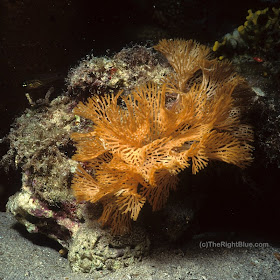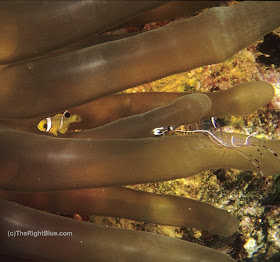by B. N. Sullivan
BNSullivan.jpg)
Over the years we have had many encounters with sharks while diving. We have told quite a few
tales about sharks here on
The Right Blue. Our readers always seem to enjoy our stories and photos of sharks, and a quick glance at the list of keywords that bring search traffic to
The Right Blue tells us that a lot of people are looking for information about sharks every day.
It should be clear to anyone who has read our tales about sharks that we enjoy seeing them in the ocean. We do not fear them, but we do respect the sharks' role as apex predators in the hierarchy of ocean life. Sharks have great value to the overall ecology of the sea.
Without question, the shark species we have encountered most frequently is the Whitetip Reef Shark (
Triaenodon obesus). We have seen this species regularly in our home waters around Hawaii, and in virtually every tropical reef environment we have visited around the world. We have seen Whitetips 'sleeping' in cavelets, on ledges, and on sandy bottoms. We have seen them actively and expertly hunting at night -- an impressive sight, indeed. Mostly we see these elegant animals lazily cruising the reefs, just like we do when we're diving.
We have never seen or heard of a Whitetip Reef Shark harming a human. They are not an aggressive shark. Neither are they valued as food for humans.
So, imagine our complete dismay and disgust when we learned recently that a Whitetip Reef Shark was senselessly killed by divers who were spearfishing at Puako, Hawaii. Here is an excerpt
from this sad story, as it appeared on a local news blog called
Hawaii247.com:
A couple of weeks ago, a resident Whitetip Reef Shark, known to countless Puako scuba divers, was speared and dragged out of the water along Puako Beach Drive.
A Puako resident who asked the young spearfishermen if they planned to eat the shark reported that they didn’t know what to do with it and that they had just shot it because they could.
As the animal thrashed around in a tidepool with a spear through it, they were unconcerned about its fate. It is likely that it died and was washed out to sea by the surf in the night.
The market value of a single shark pales in comparison to its value on the reef, alive and serving its function for reef ecology. As seemingly insignificant as the take of one shark may seem, these are not abundant animals, and, as they pose no danger to us, there is no justification for killing them for sport.
They had just shot it because they could. How brave. How sporting.
NOT!!
Some time ago, a reader asked us, via
The Right Blue contact form, what we thought of spearfishing. We sent him a reply privately, but made a note to address the issue in a blog post "one of these days." When the story about the senseless killing of that shark in Puako came to our attention, we decided that "one of these days" should be now.
Our attitudes and ideas about spearfishing have developed over time. Many years ago, in the early days of sport diving, many divers took along spearguns on nearly every dive, as a matter of course. It just seemed to be the thing to do. We never engaged in spearfishing, but many of our dive companions certainly did. Yet, it wasn't ever a question of engaging in target practice on reef fish, at least among the divers we knew. Instead, those divers speared food fish (or tried to -- they missed more often than not). If they managed to spear a grouper, sea bass, or flounder, all of us happily feasted on the catch.
Here in Hawaii, many people still spearfish. A good number of those look upon spearfishing as just another method to catch fish to put on the family dinner table. We have no quarrel with this kind of spearfishing, as a matter of principle.
We do have a big problem with spearfishing of the sort engaged in by the shark-killers in the above story. Fish -- whether sharks or angelfish or anything in between -- must not be used for target practice, ever. With spearfishing, there is no such thing as 'catch and release'. In most instances, a fish, once speared, will suffer substantial tissue and organ damage. It will not be able to survive, even if it is removed from the spear and let go. There simply is no excuse for spearing a fish you are not going to eat, just because you can. Of this we are certain.
Many conservationists oppose any sort of spearfishing by divers using scuba, reasoning that it provides the spearfisherman with an unfair, unsporting advantage over his game. They contend that spearfishing only should be allowed while free diving.
While we agree with the spirit of this point of view, we think it subsumes that spearfishing always is done just for sport. To us, "sport" implies just the kind of live target-shooting we abhor. We concede, of course, that this may be a semantic difference.
In truth, we are less concerned about whether a spearfisherman is free diving or using scuba than about his motivation. If we are talking about fishing for food, we don't see much practical distinction between spearfishing, throwing a net, or tossing a baited hook into the water.
Our core attitude about spearfishing is this: Don't spear anything you are not going to eat, and don't spear more fish (or other animals) than you need for a meal.
BNSullivan.jpg)


BNSullivan.jpg)
BNSullivan.jpg)
BNSullivan.jpg)
BNSullivan.jpg)
BNSullivan.jpg)
BNSullivan.jpg)
BNSullivan.jpg)
BNSullivan.jpg)
BNSullivan.jpg)
BNSullivan.jpg)